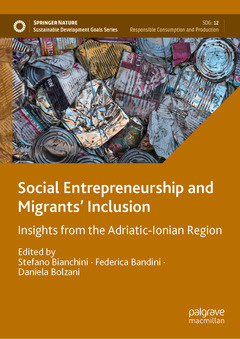Social Entrepreneurship and Migrants' Inclusion, 1st ed. 2024 Insights from the Adriatic-Ionian Region Sustainable Development Goals Series
Coordonnateurs : Bianchini Stefano, Bandini Federica, Bolzani Daniela

This book offers theoretical and empirical contributions on the approaches, policies, practices concerning the inclusion of migrants through social entrepreneurship. Grounded in a multi-disciplinary approach and with a special focus on the Adriatic-Ionian region, the book offers a debate on the antecedents, processes and outcomes of social entrepreneurship and migrants? inclusion, describing some innovative initiatives and their potential transferability in other contexts.
The Adriatic-Ionian macro-region represents an interesting yet overlooked area of research, characterized by evolving migration and inclusion policies, together with specific legislation and reforms for social entrepreneurship. The migration dynamics along the so-called Balkan Route confer to this macro-region strong political relevance in the field of security and migration management.
Contributing to the targets of SDG 8, the book contextualizes the opportunities offered by social entrepreneurship as a form of decent work for migrants, and of potential growth driver for local and international territories.
INTRODUCTION (authors: Federica Bandini, Stefano Bianchini, Daniela Bolzani)
Motivation for the book, its relevance for theory and practice, and overview of the contents.
SECTION 1
Chapter 1: A historical-political perspective on the Adriatic-Ionian area (authors: Stefano Bianchini,
Marco Zoppi, Silvia Cittadini).Chapter 2: Socio-economic inclusion of migrants in the Adriatic-Ionian area: dynamics, policies and
challenges (authors: Stefano Bianchini, Marco Zoppi, Silvia Cittadini).
Chapter 3: Social entrepreneurship: policies and institutional conditions in the EU and the Adriatic- Ionian area (authors: Francesco Savoia, Federica Bandini)Chapter 4: The management of social entrepreneurship and migrants’ inclusion: developing a
conceptual framework (authors: Eleonora Grassi, Daniela Bolzani, Federica Bandini)
SECTION 2
This section includes case studies and empirical evidence about policies and practices of social entrepreneurship for/with migrants from the Adriatic-Ionian area. At present, the following contributions could be included in the book, but we are investigating other additional contributions from Albania, North Macedonia, Croatia, and Montenegro.
Chapter 5: Possibilities of employment of asylum seekers and refugees through social entrepreneurship in Bosnia and Herzegovina (author: Alma Džanić)
Chapter 6 : Social Entrepreneurship for Refugees “in transit”: opportunities and developments in Serbia (authors: Silvia Cittadini, Katarina Ejdus)
Chapter 7: Educating asylum seekers on social entrepreneurship in Slovenia. An experiment in emancipatory approaches and participatory practices. (author: Jure Gombač)Chapter 8 : The integration of refugees through social entrepreneurship: socioeconomic environment in Slovenia (authors: Ksenija Perković, Maja Zadel, Blaž Lenarčič)
Chapter 9: Economic integration of refugees: a cross-country comparison across Slovenia, Spain, and Austria (authors: Anja Zafošnik, Simona Zavratnik)
Chapter 10: From social enterprise to social network and back: creating a social enterprise association in Greece (authors: Konstantinos Mantzos, Aspasia Theodosiou, Achilles Kameas, Christina Fili)
Chapter 11: Insights about social entrepreneurship incubation practices in Italy (authors: Giulia Martinelli, Daniela Bolzani)
Stefano Bianchini, Full Professor of East European Politics and History, University of Bologna. He was Rector's delegate for relations with Eastern Europe from 2015 to 2021. As an expert of Balkan issues, particularly on Yugoslavia and its successor states, he published 9 books, 29 edited books and more than 100 articles.
Federica Bandini, Associate Professor of Social Enterprises Management and Accounting at the University of Bologna and Fellow Senior Professor at Bocconi School of Management. She earned an ITP at London Business School, and a Ph.D. in Management for public and nonprofit organizations. She has been the Director of leading university programs on management of social enterprises and NGOs.
Daniela Bolzani, Associate Professor in Management at the University of Bologna. She has extensive research and teaching expertise in the domain of migrant, social, and academic entrepreneurship. Before starting her academic career, she worked for around five years as a professional in the fields of financial audit and international development in Europe and Africa.
In addition to SDG 8, the book has relevance to SDG 9 and SDG 10
It offers national-level and comparative evidence on social entrepreneurship and migrants’ inclusion
Highlights the evolution of social and economic inclusion of migrants in the Adriatic-Baltic area
Date de parution : 05-2024
14.8x21 cm
Thème de Social Entrepreneurship and Migrants' Inclusion :
Mots-clés :
SDGs; refugees; migration; entrepreneurship; economic inclusion


